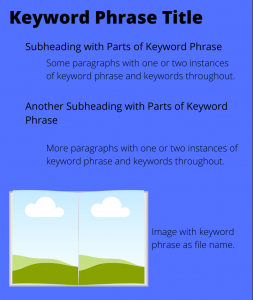I love Google. Absolutely, no doubt, when looking for an answer, I start with Google. However, if I want to be the answer Google gives to other people (thus, I please Google), I’m not so much of a fan. Good thing having Google find me is not high on my priority list.
There seems to be two ways to earn a page one rank on Google: pay a lot of money or do a lot of work. As a business of one, I’d rather do a lot of work for my clients than for SEO; additionally – as a business of one – I can think of much better ways to spend my limited funds.
Why Care
Google wants to provide relevant and accurate answers. They are even pretty good at it – why I love them. However, with the MASSIVE amounts of information on the web, finding relevant and accurate is not as easy as it sounds.
So, for those who really want to be found online, to be the answer Google provides, they need to stand out from the rest of the noise.
What Google Needs
“Relevant” for Google depends heavily on location. If someone already knows the name of the business they are looking for, they are probably not doing a search. Or they’re only searching to find out if the company’s site is a .com, .net, or dot something else.
Nope, people tend to search for a type of business and they generally want that business to be near their location. In that search, what does Google provide? First, the paid advertisements. Luckily, those entries have an “Ad” note (personally, I keep scrolling). Next comes the listing of sites that use the search term entered and meet the location requirements.
Address

So, how does Google know if a site meets the location requirements? Well, first off, if the business has a Google My Business account, they’ve provided a location. Now, here’s an annoying thing, Google gives preference to a verified brick and mortar address over a service area (hidden address).
And this is complaint number one. I work from home. Just because I know it’s easy to find an address online these days, doesn’t mean I’m making my work location public.
Local Articles
Complaint number two: just having a local address doesn’t make you as relevant as you might think. You become more relevant the more posts you have that talk about the region. And just creating a post that names your location over and over will not cut it. (People used to do that, Google got smarter.) Instead, you need a variety of pages/posts that logically mention the region you want to be associated with.
Keywords & Structure
Keywords, or search terms, should make more sense. The problem is that how a person may define their business can be different from how a client may define what they need. In this case, restaurants have it easy. Look for Italian restaurants in any city, and you’re going to get Italian restaurants, or articles on Italian restaurants, or reviews of Italian restaurants. A speech therapist, however, is not going to be on page one.
 A speech therapist is going to have a long list of keywords and will probably still be confused with a speech coach, speech writer, or someone who speaks to the dead.
A speech therapist is going to have a long list of keywords and will probably still be confused with a speech coach, speech writer, or someone who speaks to the dead.
Even if you know what words to use, you need to arrange them properly; and my writing soul has real problems with that.
- The keyword phrase needs to be in the title, slug (don’t ask), and description of the page.
- The keyword phrase needs to appear in the text, but not too many times.
- It’s really good if the keyword phrase is also in the first sentence. If you can’t do that, then it has to be in the first paragraph.
- Parts of the keyword phrase, if not the whole thing, should appear in at least some of the sub-headings.
To me, this becomes extremely redundant quickly.
Complaint number three: if you’re like me, you don’t even come up with your keyword phrase until you are ready to publish, not before you start writing!
Complaint number four: you have to track all these things, and more, to make sure they’re all working!
What Else Google Needs
Did you know that there is a lot of SEO work that goes into the creation of a website? Or, at least, there should be.
The more information there is on the internet, the better definition websites need. If someone is searching for a speech therapist but the website defines the person as something else, that’s a problem. And I’ve seen people be totally surprised by what Google sees as the definition of their site. It is something that lives in the architecture of the site, and unless you want to get really involved in web development, you are not going to be able to fix it yourself.
Complaint number five: you really do need to get your website updated every few years to stay findable.
Or a Lot of Money
I’ve talked about some of the “a lot of work,” so let’s talk about the other way to get on page one of a Google search: money.
I have absolutely no idea how much Google requires to place a site on page one. And if you do pay that money, you have “Ad” noted by the entry so contrary people – like myself – can easily skip it.
There is another option, and I suspect it costs slightly less than paying Google directly. Hire someone to do the work for you.
This is not a time to hire some kid to write posts. If you are truly looking to be on page one of a Google search, then hire a professional. And not just any professional; hire someone who knows all the tricks, stays current with all the tricks, and can do the work the tricks require.
Guess what? That professional IS NOT ME!
Guess what else? I know a guy! Adam Duran, Director of Local SEO Agency Magnified Media, is the expert who keeps telling me things about pleasing Google that make me less inclined to please Google.
If you have the budget, the desire to be on page one, and three or more employees hire Adam’s company.
If you’re missing one of those three requirements – specifically the number of employees – then check out his weekly podcast Local SEO in 10, available on most podcast platforms.
If you’re interested in any of my other SEO rants, I’ve given it a category.
– Lorrie Nicoles
